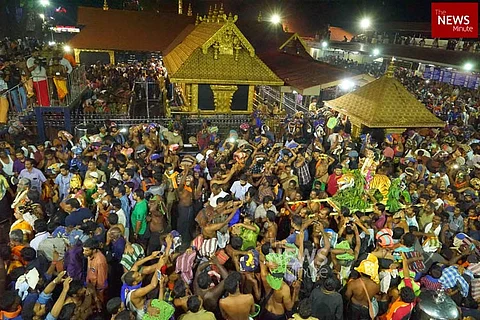

In a major verdict, the country’s apex court lifted the ban on women between the ages of 10 and 50 from entering the Sabarimala temple. Commenting on the judgement, Padma Pillai, the spokesperson for the Ready To Wait campaign, told TNM that, in her opinion, the rights of the deity and the temple have been missed out, but the people of the campaign would not visit the temple till the time they are allowed.
In August 2016, a campaign called #ReadyToWait was launched, where women said they were willing to wait till the age of 50 to enter the temple. The organizers of Ready To Wait, a group called 'People for Dharma', moved the court, demanding that women should not be allowed into Sabarimala temple.
“In my opinion, what has been missed out are the rights of the deity, the rights of the temple and the rights of Hindu religious institutions to manage their affairs in an autonomous manner,” she said.
“At the outset, for me personally and devotees like me, the verdict does not change anything. We will not visit Sabarimala till Lord Ayyapan’s permission comes to us,” Padma said.
Responding to the court’s observation that the devotees of Ayyappa do not constitute a religious denomination, Padma said that there are aspects they still require clarification on.
“The court has said that Ayyapan devotees don’t make a religious denomination, but has not said anything about how Ayyapan’s rights are being affected. Whether the deities in Hindu temples are going to continue to be legal individuals – that’s a doubt we still have. We need more clarifications,” she added.
Questioning why the court would need to intervene in Hindu temples, she said, “Why would a secular government need to interfere in Hindu temples? Are Hindu temples going to be considered public places? Are the rights to privacy and the legal rights of the deity going to be available? This sort of apartheid against Hindu temples really has to end. This is the start of the road for me.”
Responding to Justice Chandrachud’s observation that the ban, which says the presence of women deviates men from the path to celibacy, places the burden of the man’s celibacy on a woman, Padma said, “Women do not have the burden of keeping the man celibate. The man himself has the burden of keeping himself celibate and Ayyapan chose his own methods to keep his celibacy intact”.
“The Sabarimala temple was a path for men of a certain age to undertake, a certain penance to mould their personalities to become Ayyappan themselves. This path Ayyappan himself chose and said you follow my footsteps. The path was for men. So to now say this path must also be for women is, to me, very illogical because Ayyappan wasn’t a woman,” she added.
This was also the argument presented by the lawyer representing the People of Dharma in court. J Sai Deepak, a Delhi-based advocate, argued that Ayyappa in Sabarimala is a celibate and his individual rights should be protected under Article 25 of the Constitution. He said the rule is not discriminatory for it is neither based on misogyny nor menstrual impurity, rather Ayyappa’s celibacy here is a fundamental character of the temple.